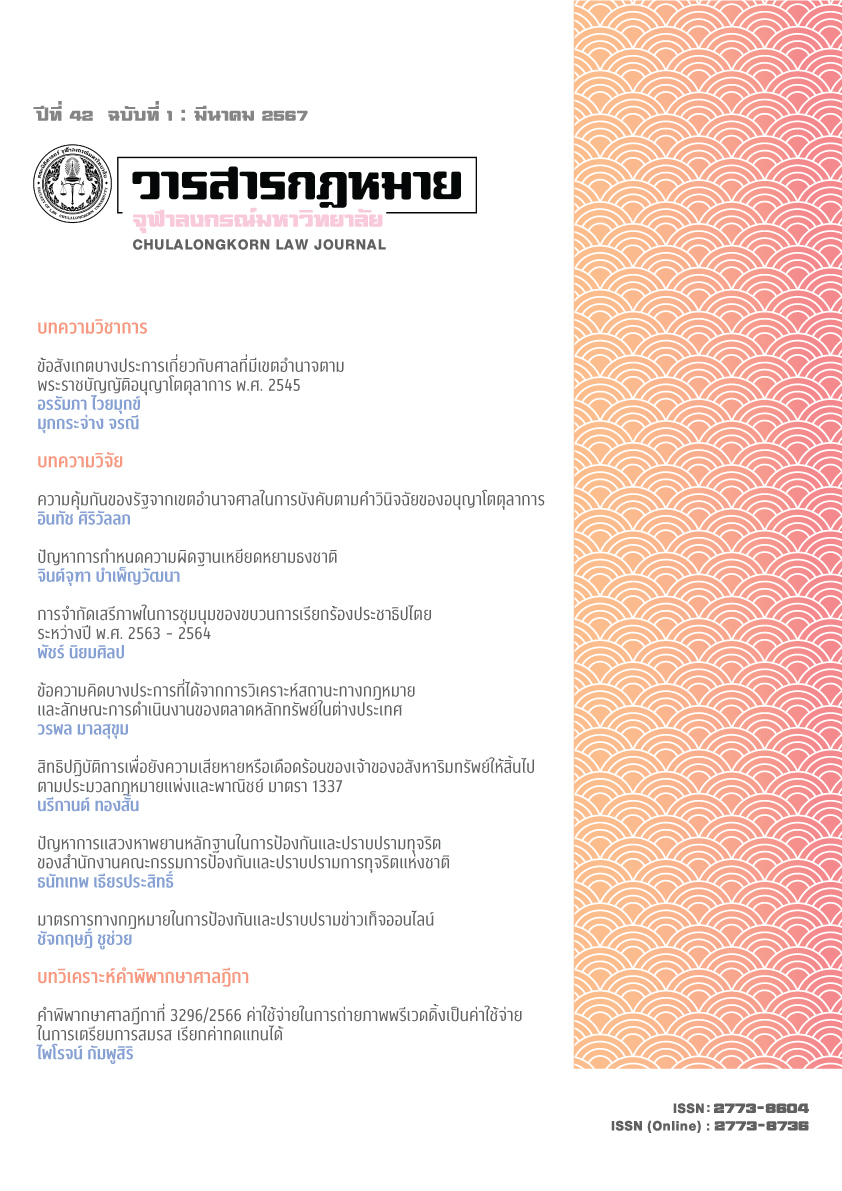ข้อสังเกตบางประการเกี่ยวกับศาลที่มีเขตอำนาจตามพระราชบัญญัติอนุญาโตตุลาการ พ.ศ. 2545
Main Article Content
บทคัดย่อ
บทความนี้มีวัตถุประสงค์เพื่อศึกษาประเด็นที่เกี่ยวกับศาลที่มีเขตอำนาจตามมาตรา 9 พระราชบัญญัติอนุญาโตตุลาการ พ.ศ. 2545 เพื่อพยายามตอบคำถามว่าสิทธิของคู่กรณีในการเลือกศาลที่มีเขตอำนาจตามพระราชบัญญัติดังกล่าวมีมากน้อยเพียงใด โดยวิเคราะห์แนวทางการวินิจฉัยตีความบทบัญญัติดังกล่าวจากศาลไทย คณะกรรมการวินิจฉัยชี้ขาดอำนาจหน้าที่ระหว่างศาล และกฎหมายต้นแบบของคณะกรรมาธิการสหประชาชาติว่าด้วยกฎหมายการค้าระหว่างประเทศ
จากการศึกษาพบว่าคู่กรณีไม่สามารถเลือกศาลใดศาลหนึ่งในสี่ศาลที่บัญญัติไว้ในมาตรา 9 ได้โดยอิสระ การพิจารณาเขตอำนาจของศาลแต่ละศาลในมาตราดังกล่าวยังคงจำเป็นต้องพิจารณากฎหมายฉบับอื่นประกอบด้วย นอกจากนี้การขาดบทบัญญัติที่ชัดเจนของพระราชบัญญัติอนุญาโตตุลาการ พ.ศ. 2545 เกี่ยวกับขอบเขตสภาพบังคับทางภูมิศาสตร์ ส่งผลให้เกิดประเด็นคำถามทางกฎหมายและข้อพิพาทเกี่ยวกับ “ศาลที่มีเขตอำนาจ” ตามพระราชบัญญัติดังกล่าวในกรณีที่การอนุญาโตตุลาการมีลักษณะระหว่างประเทศโดยไม่จำเป็น
บทความนี้มีข้อเสนอแนะว่า พระราชบัญญัติอนุญาโตตุลาการ พ.ศ. 2545 ควรกำหนดขอบเขตสภาพบังคับทางภูมิศาสตร์ให้ชัดเจนในลักษณะเดียวกันกับกฎหมายต้นแบบเพื่อกำหนดเขตอำนาจของศาลไทยในการอนุญาโตตุลาการระหว่างประเทศ สำหรับเขตอำนาจระหว่างศาลภายในประเทศ ควรกำหนดเขตอำนาจระหว่างศาลยุติธรรมและศาลปกครอง และของศาลทรัพย์สินทางปัญญาและการค้าระหว่างประเทศ รวมทั้งกำหนดศาลที่มีเขตอำนาจในขั้นตอนการให้ความช่วยเหลือกระบวนการอนุญาโตตุลาการ และในการเพิกถอนหรือบังคับคำชี้ขาดแยกจากกันให้มีความชัดเจน
Article Details

อนุญาตภายใต้เงื่อนไข Creative Commons Attribution-NonCommercial-NoDerivatives 4.0 International License.
ลิขสิทธิ์และเนื้อหาในเว็บไซต์ของวารสารกฎหมาย (รวมถึง โดยไม่จำกัดเฉพาะ เนื้อหา รหัสคอมพิวเตอร์ งานศิลป์ ภาพถ่าย รูปภาพ ดนตรีกรรม โสตทัศนวัสดุ) เป็นกรรมสิทธิ์ของวารสารกฎหมาย และผู้ได้รับการโอนสิทธิทุกราย
1. วารสารกฎหมาย ให้อนุญาตให้คุณใช้สิทธิอันไม่เฉพาะเจาะจงที่สามารถถูกถอนเมื่อใดก็ได้ โดยไม่มีค่าใช้จ่าย ในการ
- เยี่ยมชมเว็บไซต์และเอกสารในเว็บไซต์นี้ จากคอมพิวเตอร์หรือเครื่องมือสื่อสารผ่านเว็บบราวเซอร์
- คัดลอกและจัดเก็บเว็บไซต์และเอกสารในเว็บไซต์นี้บนลงคอมพิวเตอร์ของคุณผ่านระบบความจำ cache
- สั่งพิมพ์เอกสารจากเว็บไซต์นี้สำหรับการใช้ส่วนตัวของคุณ
- ผลงานที่ได้รับการตีพิมพ์โดยวารสารกฎหมาย จุฬาลงกรณ์มหาวิทยาลัย ถูกคุ้มครองภายใต้ Creative Commons Attribution 4.0 International License ซึ่งอนุญาตให้ทุกคนสามารถคัดลอก แจกจ่าย ดัดแปลง ส่งต่อ ผลงานได้ ก็ต่อเมื่อผลงานและแหล่งข้อมูลได้รับการอ้างอิงอย่างเหมาะสม
2. วารสารกฎหมาย จุฬาลงกรณ์มหาวิทยาลัย สงวนสิทธิ์ไม่อนุญาตให้คุณใช้สิทธิอื่นใดที่เกี่ยวข้องกับเว็บไซต์และเอกสารบนเว็บไซต์นี้ เช่น การคัดลอก ดัดแปลง เปลี่ยนแปลง ส่งต่อ ตีพิมพ์ แจกจ่าย เผยแพร่ จัดแสดงในที่สาธารณะ ไม่ว่าจะในรูปแบบใดก็ตาม ซึ่งเว็บไซต์หรือเอกสารบนเว็บไซต์ โดยไม่อ้างอิงถึงแหล่งข้อมูลหรือโดยไม่ได้รับอนุญาตเป็นลายลักษณ์อักษรจากวารสารกฎหมาย จุฬาลงกรณ์มหาวิทยาลัย
3. คุณอาจขออนุญาตที่จะใช้เอกสารอันมีลิขสิทธิ์บนเว็บไซต์นี้โดยการเขียนอีเมลล์มายัง journal@law.chula.ac.th
4. วารสารกฎหมาย จุฬาลงกรณ์มหาวิทยาลัย เข้มงวดกับการคุ้มครองลิขสิทธิ์อย่างมาก หากวารสารกฎหมาย จุฬาลงกรณ์มหาวิทยาลัยพบว่าคุณได้ใช้เอกสารอันมีลิขสิทธิ์บนเว็บไซต์นี้โดยไม่ถูกต้องตามการอนุญาตให้ใช้สิทธิ ดังที่กล่าวไปข้างต้น วารสารกฎหมาย จุฬาลงกรณ์มหาวิทยาลัยอาจดำเนินคดีตามกฎหมายต่อคุณได้ เพื่อเรียกร้องค่าเสียหายที่เป็นตัวเงินและคำขอชั่วคราวให้คุณหยุดการใช้เอกสารดังกล่าว ทั้งนี้ คุณอาจถูกสั่งให้ชดใช้ค่าใช้จ่ายใดๆ ที่เกี่ยวข้องกับการดำเนินการตามกฎหมายนี้
หากคุณพบเห็นการใช้เอกสารอันมีลิขสิทธิ์ของวารสารกฎหมาย จุฬาลงกรณ์มหาวิทยาลัย ที่ขัดหรืออาจขัดต่อการอนุญาตให้ใช้สิทธิดังที่ได้กล่าวไปข้างต้น โดยเชื่อว่าได้ละเมิดลิขสิทธิ์ของคุณหรือของผู้อื่น สามารถร้องเรียนมาได้ที่ journal@law.chula.ac.th
เอกสารอ้างอิง
Art 17 J. of UNCITRAL Model Arbitration Law 2006
Article 1(2) of UNCITRAL Model Arbitration Law 1985
Article 1(2) of UNCITRAL Model Arbitration Law 2006
Article 20 of UNCITRAL Model Arbitration Law
Article 27 of UNCITRAL Model Arbitration Law 2006
Frank-Bernd Weigand and Antje Baumann, Practitioner's Handbook on International Commercial Arbitratio, (Oxford University Press, 2019)
Margaret L. Moses. "Judicial Assistance for Arbitration," in The Principles and Practice of International Commercial Arbitration: 87-121 (Cambridge: Cambridge University Press, 2012)
ไชยวัฒน์ บุนนาค, อนุญาโตตุลาการ : ทฤษฎีและปฏิบัติ, (กรุงเทพมหานคร: ทรัพย์สุรีย์, 2552)
ธวัชชัย สุวรรณพานิช, คำอธิบายพระราชบัญญัติอนุญาโตตุลาการ พ.ศ. 2545, (กรุงเทพมหานคร: สำนักพิมพ์นิติธรรม, 2558)
มาตรา 16 พระราชบัญญัติอนุญาโตตุลาการ พ.ศ. 2545
มาตรา 26 พระราชบัญญัติอนุญาโตตุลาการ พ.ศ. 2545
มาตรา 33 พระราชบัญญัติอนุญาโตตุลาการ พ.ศ. 2545
มาตรา 37 วรรคสาม พระราชบัญญัติอนุญาโตตุลาการ พ.ศ. 2545
อำพน เจริญชีวินทร์, คำอธิบายการฟ้องและการดำเนินคดีในศาลปกครอง ภาค 1 เขตอำนาจศาล, (กรุงเทพมหานคร: นิติธรรม, 2564).


